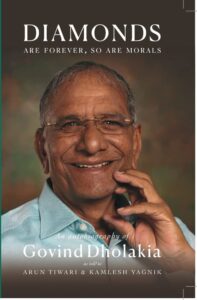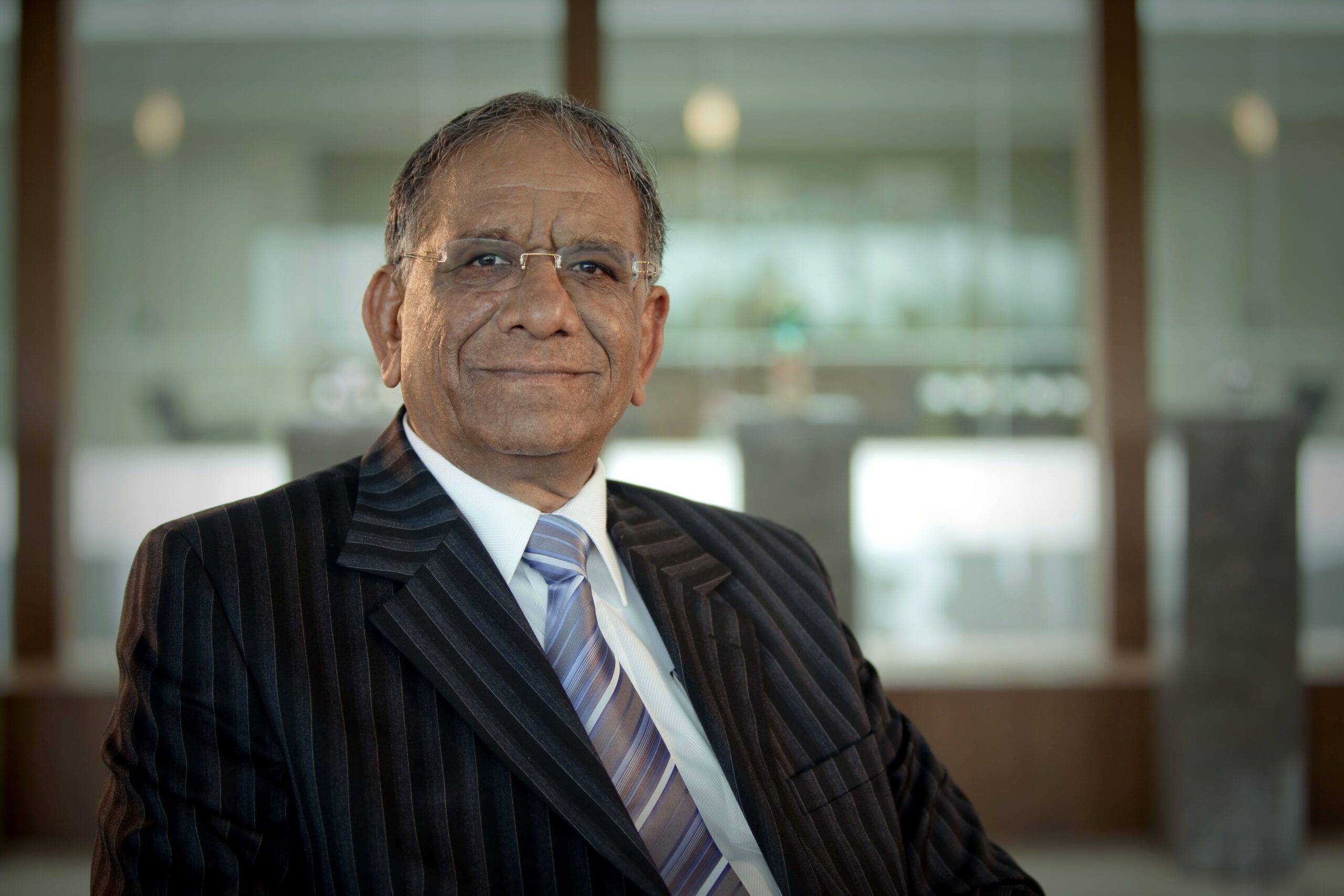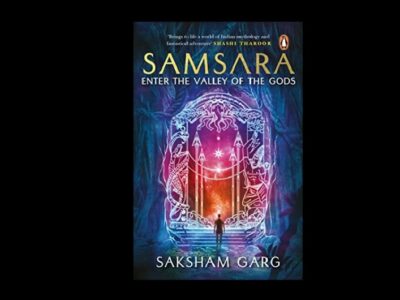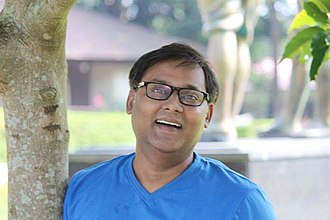‘Diamonds Are Forever, So Are Morals’ – there can be no better title to the autobiographical story of the diamond tycoon, founder and chairman of Shree Ramkrishna Exports Pvt.Ltd, Govind Dholakia. Here is an inspiring story of a son of a farmer from a remote village in Gujarat, who started small – as a diamond polisher, but nurtured big dreams and went on to achieve them
 In the foreword to Govind Dholakia ‘s book, ‘Diamonds Are Forever, So Are Morals’, Professor Bhikhu Parekh, London, House of Lords says, Govind’s life is held together by a guiding philosophy of life or what he calls the Triveni of life. This involves three basic beliefs, namely that honesty and ethics should inform all human activities, that there is a God or an unseen force that permeates everything. and finally that the family should be at the centre of one’s life.
In the foreword to Govind Dholakia ‘s book, ‘Diamonds Are Forever, So Are Morals’, Professor Bhikhu Parekh, London, House of Lords says, Govind’s life is held together by a guiding philosophy of life or what he calls the Triveni of life. This involves three basic beliefs, namely that honesty and ethics should inform all human activities, that there is a God or an unseen force that permeates everything. and finally that the family should be at the centre of one’s life.
These simple principles stayed with Govind Dholakia through his journey, and how. The autobiography of a curious youngster who sets out to discover the world, and himself; growing from strength to strength, impacting lives through his work and deeds is fun to read, and inspiring at the same time.
In Govind Dholakia s own words – this book is about – How did a diamond polisher, who earned Rs 103 In his first month after a six-month apprenticeship without payment, become a billionaire employing 5000 people earning over a million dollars every month?
How did a farmer’s son who would watch in disbelief at the aircraft occasionally flying in the sky over his village start an airline and connect towns in Saurashtra with other cities in mainland Gujarat?
Here’s an extract from initial days of Govind Dholakia enterprise – Shree Ramkrishna Exports – that gives a peek into how the billions worth diamond business started with just Rs 500.
It was last Sunday … They were very happy with our work and started giving us as many roughs, as we wanted.
It was the last Sunday of January 1970. Bhagwanbhai and I went to a Crystal Ball Reading shop. For a fee of Rs 10, one was allowed to ask three questions. I had only one question and it was about how to start my own business. As instructed, I sat in front of the crystal ball in a relaxed manner. Focusing on my breathing and observing it to calm down for few minutes, I placed my hands on the crystal ball and visualized my business office. Then I took my hands off the crystal and took a good look at the ball, allowing my eyes to relax and become unfocused. I could see some sort of mist forming inside of the crystal and converting into an image of three people sitting on a table and talking to each other.
There was no doubt in mind who these three persons were. I could see Virjibhai, Bhagwanbhai and me working in our own factory. We got one room in Nagoriwad for a monthly rent of Rs 45. It was a small room of 10 x 15 feet but big enough for our ambition at that time. On Thursday, 12 March 1970, at 1.15 p.m., a time that was considered auspicious, we cracked a coconut, ate some sugar, and started the factory. Virjibhai’s brother, Hiralal, and brother-in-law, Devshibhai, also joined the factory. Rameshbhai Pachchigar was our Tax Advisor and Prabhakarbhai Trivedi our first accountant. In fact, Rameshbhai’s sons Rupin and Janak would later be associated with our business carrying forward their father’s legacy.
We needed a good name for our company. Dongreji Maharaj had come to our rescue. Following his teaching that only God’s grace leads to any accomplishment, hence, one must always start everything in God’s name and keep God’s share in the business that would be used for helping others in God’s name. It was beyond doubt that our company’s name would be in the name of God. Being Vaishnavas, we worship the incarnations of Lord Vishnu in human form—Shree Ram and Shree Krishna with equal zeal and reverence and ‘Shree’ meant the Hindu Goddess Laxmi, i.e., Goddess of Wealth. Hence, we registered the Shree Ramkrishna (SRK) Export Company in Surat with three of us as equal partners. In Bombay, Mohan Mama offered his motor garage at the Opera House for our office.
We started dealing with Hirabhai Vadiwala who received rough diamonds from P. D. Kothari, a Jain businessperson from Palanpur. Prevailing norms defined that the weight of the diamonds after polishing must be at least 28 per cent that of rough. The rest of the mass becomes dust, like powder of no worth. Working skillfully and with great caution, we consistently achieved 34 per cent of finished diamond product. It was an uncommon achievement. However, Hirabhai was not happy as 28 per cent was considered a normal yield during that period. He told us that this would not only create problems for other cutters and polishers but also create confusion in the industry. He advised me not to declare this additional yield and replace heavier diamonds with smaller diamonds to match the 28 per cent yield. ‘This will also fetch you more money,’ he said. I told him, ‘No matter what, I shall never indulge in such unscrupulous activity, and neither would I ever move away from the path of honesty.’ I refrained myself doing as he suggested and left the matter to his discretion. Later, I reasoned with myself, ‘If six per cent more yield is possible, why should not I do this work on my own. I will get more profit. I should produce my own stuff.’ Now, the question was, from where I could get rough diamonds.
As if guided by an unseen force, one day in April 1970 with Rs 500 in pocket I peddled my bicycle to Rameshbhai Shah’s office. Rameshbhai was fondly called Raj Kapoor for his good looks and charming manners. I climbed the staircase and found Rameshbhai’s brother Vasantbhai sitting there. He was of my age. ‘I want to buy rough diamonds.’ I said without beating around the bush. Vasantbhai looked at me for some time. Perhaps he was trying to assess if I had any money. He asked softly, ‘Cash or on credit?’ ‘Cash’ I said. ‘We do not have any rough diamonds right now, but as you want to buy with cash, I will come with you. And you will have to give me one per cent brokerage.’ I was determined, so I said yes without any hitch.
Vasantbhai took me to a few shops that were offering discounts. I wondered how there could be a discount on diamonds. After an hour of wandering, we landed at the office of Babubhai Rikhavchand Doshi and Bhanubhai Chandubhai Shah. They quoted Rs 91 as the price of one carat, but a minimum purchase of ten carats had to be made. That meant Rs 910 and a brokerage of Rs 10 had to be added. I said, ‘Sir, I only have Rs 500.’ ‘It is not a problem. Give Rs 500 right now. The rest Rs 410 you can give after reaching your home. Vasantbhai will accompany you. Give the balance of money to him,’ he said. The problem was that there was no money at home. Whatever I had with me was in my pocket. However, I did not want to miss the opportunity. Hence, I promptly made the payment of Rs 500. To make the remaining payment of Rs 410, I took Vasantbhai to my friend Virjibhai’s house. Asking Vasantbhai to wait outside, I went inside the house. I told Virjibhai, ‘Look brother, we will now do our own work. For that, we will have to take the risk of buying rough,’ and then described what had happened. ‘The problem is that there is a shortage of Rs 410, which has to be paid to the businessman and an additional Rs 10 as brokerage to the man standing outside,’ I told Virjibhai. ‘O Bhagat! What is the problem in that?’ Virjibhai replied in his typical style. Nevertheless, there was a problem. Virjibhai called his wife, Shardaben, who was working in the kitchen. He told her to give me Rs 200 that she had for the household expenses. Then Virjibhai went to his neighbour Narsinhbhai Khalparwala and took Rs 200 on credit. He added then Rs 20 that he had in his wallet and said, ‘Lo, Bhagat, the work is accomplished, Rs 420 done.’ I went out, paid Vasantbhai the money, and made the first trade in my life. We sold the polished diamonds to Babubhai at 10 per cent profit after about a week. They were very happy with our work and started giving us as many roughs, as we wanted.
God’s ways are beyond human comprehension. The moment you feel you are done; some strange thing happens pushing you for change. Babubhai Doshi had an associate from his village Vav, called Chinubhai Chamanlal Shah, who used to work in Bombay as a broker in the diamond market. In August 1970, he had some problems with his business. Hence, he came to live in Surat for a while. I met him at the office of Babubhai. One day, Chinubhai told me that my cutting was very good and that I must go to Bombay to get higher appreciation for my skills. God used Chinubhai to guide me on my path.
Excerpted with permission from Diamonds Are Forever, So Are Morals: Autobiography of Govind Dholakia
by Arun Tiwari and Kamlesh Yagnik
Hardback, Rs 699, Published by Penguin Enterprise
















